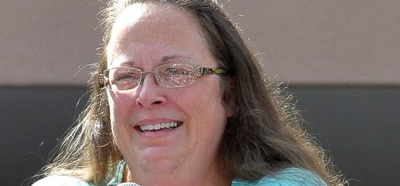Kim Davis –no Rosa Parks
Rowan County Clerk, Kim Davis, disagrees with the settled law of the land and is refusing to issue marriage licenses to same-sex Kentucky couples in violation of a federal court order. As an elected county officer, whose role is ministerial and not judicial, Davis’ acts of civil disobedience are in direct contravention of the laws that she has been elected to uphold.
Despite her belief that it is unconstitutional and against her religious values for same-sex couples to marry, by refusing to issue marriage licenses, Davis is interpreting the law and acting on her own accord, which will cause a ripple effect and stir opponents of gay marriage everywhere to do the same.
On July 13, 2013, Montgomery County Register of Wills, D. Bruce Hanes, started issuing marriage licenses to same-sex couples in direct contravention to the Pennsylvania 1996 law that defined marriage as only between a man and a woman.
By the time he was ordered to cease and desist by a Commonwealth Court, Hanes had issued 174 marriage licenses. Hanes’ actions were seemingly similar yet massively different from Davis’ actions as it relates to rule of law. When a state judge ordered Hanes to stop issuing licenses, Hanes appealed, but followed the ruling. He worked within the legal system in an effort to change it; Davis on the other hand refused to follow U.S. District Court Judge David Bunning’s order and was jailed as a result.
As an advocate, I understand and respect civil disobedience for the greater good. Historically, civil disobedience has been a powerful force in fighting against unjust government actions. Rosa Parks was a catalyst of change when she decided to sit where she was unwelcome. At that point in history the law did not protect Park’s rights, so she took the law into her own hands. As an attorney, my issue with Davis’ actions is that it rule of law is being discarded; the most important of her responsibilities.
When properly functioning, the rule of law sets a foundation for how governments operate and laws by which people are expected to abide. Unfortunately, in today’s political landscape, it is easy for politicians, and often applauded, to have knee-jerk reactions to situations they find offensive or in conflict with their beliefs.
But what is rule of law? One of the best definitions I’ve come across is by the World Justice Project. They do not define it per se but instead set the groundwork for the principles inherent in a system in which rule of law is respected:
1.The government and its officials and agents as well as individuals and private entities are accountable under the law;
2. The laws are clear, publicized, stable, and just; are applied evenly; and protect fundamental rights, including the security of persons and property;
3. The process by which the laws are enacted, administered, and enforced is accessible, fair, and efficient;
4. Justice is delivered timely by competent, ethical, and independent representatives and neutrals who are of sufficient number, have adequate resources, and reflect the makeup of the communities they serve.
In analyzing Davis’ situation, contrary to her opinion, she is accountable under the law and had her liberty abridged while spending the night in jail for her actions.
While conservatives are comparing Davis to Rosa Parks, marriage equality opponents are juxtaposing her with the many officials who either ignored or refused to defend state bans on same-sex marriage. The Heritage Foundation’s Daily Signal published a list of ten such comparisons last week, 8 of whom were governors or attorney generals who refused to defend their state bans from challenges in court. All eight had a sworn duty to uphold the U.S. Constitution, which motivated their decisions not to defend the bans, a decision that was within the discretion of their position and yet meanwhile, they all upheld the rule of law and enforced the bans until they were declared unconstitutional.
The two examples Heritage offered of individuals who refused to enforce a same-sex marriage ban, was our very own D. Bruce Hanes, the Register of Wills in Montgomery County and long-time LGBT rights advocate, former San Francisco Mayor Gavin Newsom, who issued over 3,000 marriage licenses to same-sex couples in early 2004 despite California’s ban on same-sex marriage still being in place. Similar to Hanes, once the court ordered Newsome to stop issuing licenses, he did. Neither Hanes nor Newsom were ever in contempt of court like Davis and that makes Davis unique. She was not exercising discretion as empowered by her position. Instead, when the court ordered her to obey the law, she refused.
Contrary to Hanes and Newsom’s actions, Kim Davis’ actions have caused confusion surrounding the laws as they apply to her position as well as the validity of marriage licenses that are being issued without her signature.
Regarding her position, Davis believes that a law should be enacted to accommodate her religious and moral beliefs and perform her duties simultaneous. In reality, Davis’ feelings, moral beliefs and values surrounding same-sex individuals marrying are irrelevant to her performing her duties as the County Clerk. Davis’ job in no way requires her to “condone or endorse same-sex marriage”; her responsibility is simply to certify that the information provided on their marriage application is accurate (date of birth, father’s name etc) and that the couple is qualified to marry under Kentucky law. In other words, Davis’ primary function is paperwork and filing, not authorizing or officiating.
Every accommodation Davis has suggested would either require someone else to do her duties, such as “deputizing a neighboring county clerk” to issue licenses in her county or a legislative revision of the marriage licenses in Kentucky to remove her name altogether. One accommodation, has already legally been rejected by Judge Bunning, which would be to “deem her absent” so that the chief executive of the county can issue the licenses. Judge Bunning pointed out that “this is certainly a creative interpretation,” but there was no legal precedent to support it. Imagine the upheaval if every official who refused to acknowledge the legal existence of same-sex marriage had to be “accommodated”.
It would disembowel and undermine Obergefell’s guarantee that same-sex couples have the right to marry on the same terms and conditions as opposite-sex couples.
In addition to the question of whether laws should be enacted to accommodate Davis, there is question as to whether or not the licenses that have been issued since last Friday without her signature are even valid. When Judge Bunning held Davis in contempt last week, he offered to negate jail time if she allowed her deputies to issue marriage licenses on her behalf. She refused, went to jail and despite that, the deputies began issuing licenses on Friday anyway.
With that said, Judge Bunning acknowledged that he was uncertain as to their validity. Davis’ lawyers are insisting that all licenses issued without her name on it “[a]re not worth the paper that they are written on.” However, after hours of research, Bunning found a simple sentence in Kentucky law that seems to clear things up. According to statute 61.035, “[a]ny duty enjoined by law or by the Rules of Civil Procedure upon a ministerial officer, and any act permitted to be done by him, may be performed by his lawful deputy.” As such, since Davis can issue licenses, so can her deputies and there is little to suggest that these licenses could ever be rejected as non-binding.
Rule of law exists to avoid all of this confusion. Hanes and Newsom stood for their beliefs, raised awareness and then when it came to following the rule of law, they complied. Hanes and Newsom were on the right side of history, wrong side of the black letter of the law, all while upholding the rule of law. Davis on the other hand? She’s a world unto her own. Civil servants should never forget that they serve the people; and people in a democratic society deserve rule of law.
Angela D. Giampolo is Founder of PhillyGayLawyer.com and Giampolo Law Group whose practice focuses on LGBT law, corporate transactions, civil rights, employment discrimination, real estate, domestic and international adoptions, and estates.












